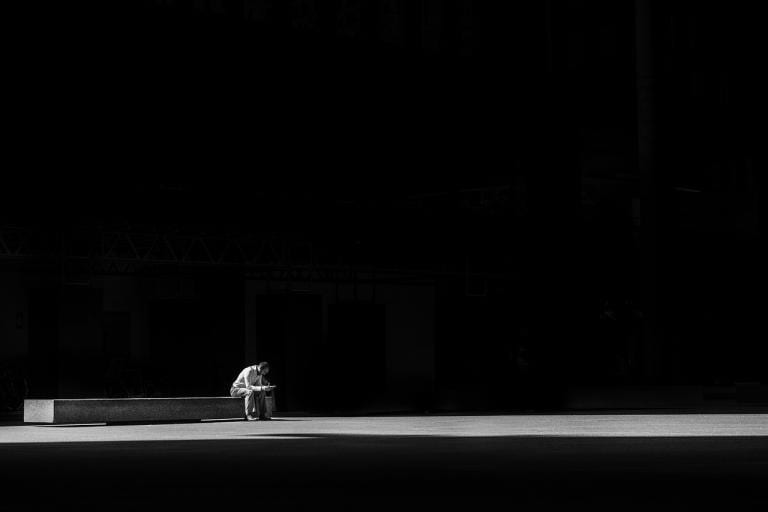I’ll get back to talking about wanking and what-not in a while. For now, I want to talk a little about spirituality.
The spiritual life is, I think, fundamentally concerned with the relationship between the self and the other. I don’t just mean that it’s about how we relate to other people, or how we relate to God-as-other, but that it’s about healing a fundamental existential wound that has its source in our particularly human form of conscious subjectivity.
John Paul II talks quite a lot about this in his theology of the body (frankly, his thoughts on subjectivity were probably the most interesting aspect of that work and it’s kind of shame that they get sidelined in the discussion of sexual intersubjectivity. But whatever.)
One of his insights is that human subjectivity establishes a relationship with the rest of creation in which the human person experiences him or herself as “alone” in a way that is problematic. John Paul II construes the problem of aloneness in ontological and even metaphysical terms and proposes that God creates sexuality (which in JPII becomes paradigmatic for all intersubjective relationships) as a solution.
I don’t propose anything quite so ambitious, but I think that the essential problem — the experience of aloneness — is indeed the heart of the human spiritual impulse. We find ourselves alone and, more importantly, lonely: alienated from the rest of creation. Spirituality then becomes the set of practices and ideals by which we seek to heal that sense of alienation.
Original Trauma
It must have been a long awakening. If we go back to the myths and legends of pre-agricultural peoples it’s clear that the wound is somehow not so deep as it is in the “civilized” world. For hunter-gatherers and even early horticulturalists it seems to be perfectly natural to assume that non-human animals and even inaminate objects possess a kind of interiority that mirrors our own subjectivity.
The bears are not merely bears, they are a people with a language of their own and they engage in roughly human type activities: seeking mates, engaging in contests, tricking one another. The line between the human peoples and the animal peoples is often so blurred that a human might become an animal or visa versa, usually through an exchange of skin.
The animist is not alone. She lives in a world where human-type subjectivity does not set her apart. The winds have thoughts. The birds hatch plots in the tree-tops. The rocks sleep long sleeps and will one day awaken.
She is conscious of her own subjectivity, but not yet conscious that it is unusual.
Then something happens. Some early calamity in human psychological development — a trauma so ancient that it is recorded in our myths but not remembered by our histories. Man suffers a slow dawning suspicion. The rocks are not asleep. The winds have no dreams. The animals are not speaking. He is alone.
This realization that other things are not like us, that they do not possess a conscious, subjective interior life, seems to be profoundly troubling to the human ego. The realization of our own difference is somehow terrifying. It’s as if we’re small children afflicted with separation anxiety as we slowly come to understand that mother earth does not merely an extension of the self.
Other things exist and they are actually, truly, deeply other. They follow laws unlike the laws the govern our own interior. They operate according to principles that cannot be predicted in human terms. Therefore they are threatening.
My knowledge of anthropology isn’t nearly sufficient to trace the history of this sense of alienation. I do know that religion, and more specifically spirituality and mysticism, offer a set of techniques and practices whose essential purpose is to salve the sense of existential dread which arises from this primordial experience of loneliness.
But Are We Alone?
Various spiritual practices offer different solutions to the problem. Roughly (and I’m massively oversimplifying here because this is a blog post and not a weighty treatise) these solutions are as follows:
1. The outside world is illusion. Only the interior, subjective self really exists. There is no alienation because there is no other.
2. All things have their source in a single, all-encompassing subject. The differences which set us apart from other created things actually make us special, more like the source of all being. Existence itself is conscious, subjective, and personal just like us.
3. Otherness is not threatening. We experience the other as threatening only because of our ego-consciousness which perceives itself as being in a hostile or competitive relationship with the rest of existence. If we obliterate the ego then we cease to be threatened by the other.
4. We are wrong to think that we are unique. Everything is conscious. Maybe the rock is not individually conscious, but the planet is conscious and the rock is a part of its body. Animals have animal consciousness. Stars have star-minds. We are only alone because we choose to isolate our consciousness from the innumerable spirits that haunt the universe.
5. We are but the first glimmers of a universal consciousness. Like the first neurons firing in the darkness of a fetal brain, human subjectivity flickers in the silent, insensate universe. Slowly we build connections between ourselves and one day we will become a single consciousness and all of existence will be our body.
It seems to me that all of these solutions, in different ways, reveal something about our existential angst. Namely: we have a lot of difficulty dealing with difference and alterity. In one way or another the conscious self, the ego, needs to appropriate or subdue everything that is not itself. Whether it does this by projecting itself onto the vault of the heavens or by denying that there is anything beyond its own perceptions, the end product is the same. The threat of the other is annihilated by annihilating otherness.
The Eastern option rather cleverly turns this on its head and seeks to solve the problem by annihilating the ego. But it still, at least in its simple form, accepts the fundamental axiom that our existential dilemma requires the obliteration of something or other — that the ego and the other cannot actually peacefully coexist. One of them has got to go.
Either the self has to dissolve into the ocean of the absolute, or the ocean has to be absorbed into the self.
Vive la Différence
I’ve been thinking lately that maybe the problem itself is the problem. I mean, what if it’s just okay for us to be different and for other things to be other than us. What if possessing ego-consciousness is just a thing that humans do, kind of like copper conducts electricity and water freezes below 0° C. What if it doesn’t make us superior or isolated. What if it just is.
Could we direct our spiritual energies towards the project of simply allowing the other to be other? Let go of the need to see our own reflection in the mirror of creation. Let go of the desire to be infinite and eternal. Let go of the thirst to pierce the mystery of creation, to take all of the beauty that surrounds us and demand that it yield to our understanding.
What if we could learn to just enjoy existence, including the finite, bounded, subjective self in all of its difference and its solitude? What if we pursued the ability to love the other as other, without needing it to reflect, validate or advance the projects or ideals of the self?












